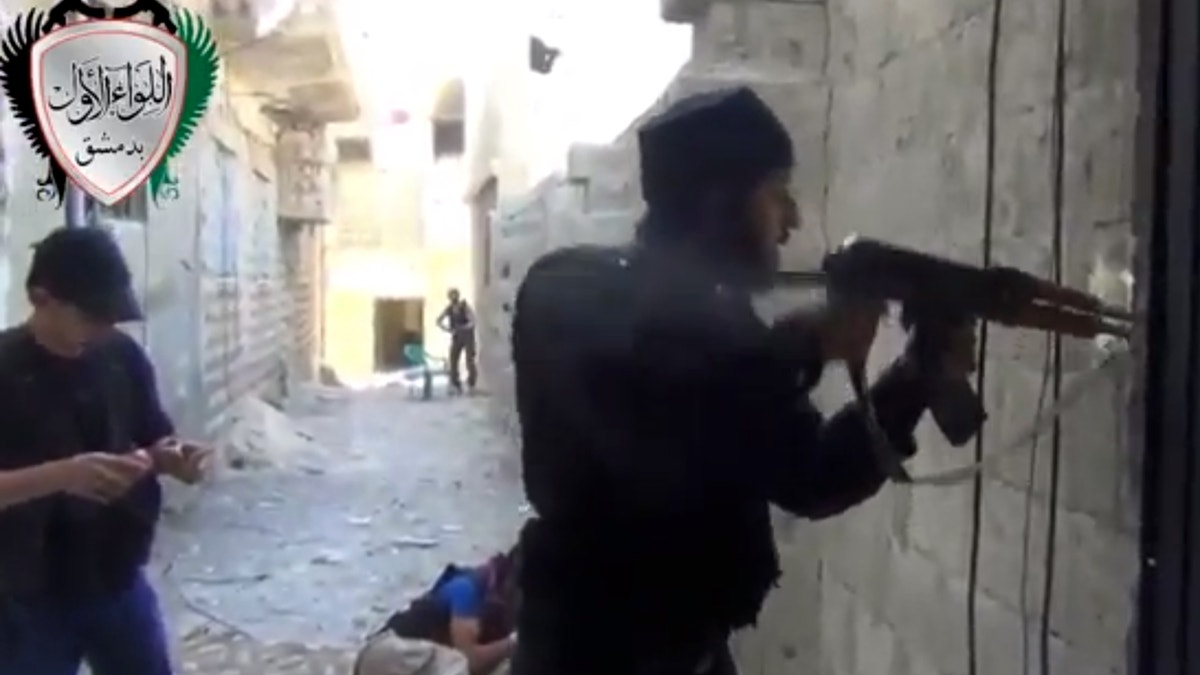
Friday, May 3, 2013 - Image taken from video obtained from the Ugarit News shows Syrian rebels clashing with government forces in Damascus, Syria. (AP)
BEIRUT – Syria's main opposition group on Friday accused President Bashar Assad's regime of committing a "large-scale massacre" in a Sunni village near the Mediterranean coast in which activists say at least 50 were killed with guns, knives and blunt objects.
The killings in Bayda reflect the sectarian overtones of Syria's civil war. Tucked in the mountains outside the Mediterranean coastal city of Banias, the village is primarily inhabited by Sunni Muslims, who dominate the country's rebel movement. But it is located in the heartland of President Bashar Assad's Alawite sect, an offshoot of Shiite Islam that is the backbone of the regime.
In amateur video purportedly taken after the killings, the bodies of at least seven men and boys are seen strewn in pools of blood on the pavement in front of a house as women weep around them.
"Don't sleep, don't move," one woman sobs, leaning over to touch one of the men, who appeared already dead. The video appears genuine and consistent with reporting by The Associated Press from the area.
The war has largely split the country along sectarian lines, with the divide deepening over months of bloodshed. There has been heavy fighting in recent weeks between Sunnis and Shiites over villages near the Lebanese border, while Islamic extremists in the rebel ranks have injected a radical fervor, often referring to their adversaries with derogatory names insulting their sects.
The regime has so far kept a relatively solid grip on the Alawite heartland, centered on the mountainous region along the coast. The area is dotted with Sunni villages, but they are surrounded by larger Alawite communities, so the anti-Assad revolt has had a harder time taking hold.
Early Thursday, there was an eruption of fighting in Bayda and then in the afternoon, Syrian troops backed by gunmen from nearby Alawite villages swept into the village, according to the Britain-based Syrian Observatory for Human Rights.
They torched homes and used knives, guns and blunt objects to kill people in the streets, the group said. It said it has documented the names of at least 50 dead in Bayda, but that dozens of villagers are still missing and the death toll could rise to as high as 100.
Syria's state news agency said late Thursday that the army conducted a raid in Bayda, killing several "terrorists" and seizing machine guns, automatic rifles and other weapons. The government refers to those trying to oust Assad as "terrorists."
Syrian troops were still in Bayda on Friday, conducting house to house searches, according to the Observatory's director, Rami Abdul Rahman. He added that phone and Internet service to the village was cut, making it impossible to verify the final death toll or pin down more details on what happened.
If confirmed, the bloodshed in Bayda would be the latest in a string of alleged mass killings in Syria's civil war. Last month, activists said government troops killed more than 100 people as they seized two rebel-held suburbs of Damascus.
The main Western-backed opposition group, the Syrian National Coalition, condemned what it called "a large-scale massacre in Bayda," and urged the international community to act to protect Syrian civilians.
"It is time for the world to intervene and put an end to the grievous crimes of the Assad regime," the Cairo-based group said in a statement.
While the U.S. and its European and Gulf allies have backed the opposition forces, they have been reluctant to provide the rebels fighting Assad's troops with weapons that could stand up to the regime's superior firepower. They fear the arms could end up in the hands of radical Islamic groups that in the past year have become the most effective fighting force on the opposition's side.
On Thursday, President Barack Obama said his administration was looking at every option to end the bloodshed in Syria. Speaking at a news conference in Mexico City, Obama said the administration was proceeding cautiously as it looked at options to ensure that what it does is helpful to the situation rather than making it more deadly or complex.
In Washington, U.S. Defense Secretary Chuck Hagel, became the first top American official to publicly acknowledge that the administration was rethinking its opposition to arming the Syrian rebels. Hagel said Thursday that "arming the rebels -- that's an option," but added that the administration was looking at all options.
The Syrian conflict, now in its third year, started with largely peaceful protests against Assad's rule in March 2011, but shifted into an armed insurgency as opposition supporters took up weapons to fight a harsh regime crackdown on dissent.
The conflict has devastated the country, killing more than 70,000 people, forcing more than 1 million Syrians to seek refuge in neighboring countries such as Jordan, Lebanon and Turkey and displacing millions more inside Syria.
